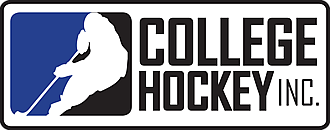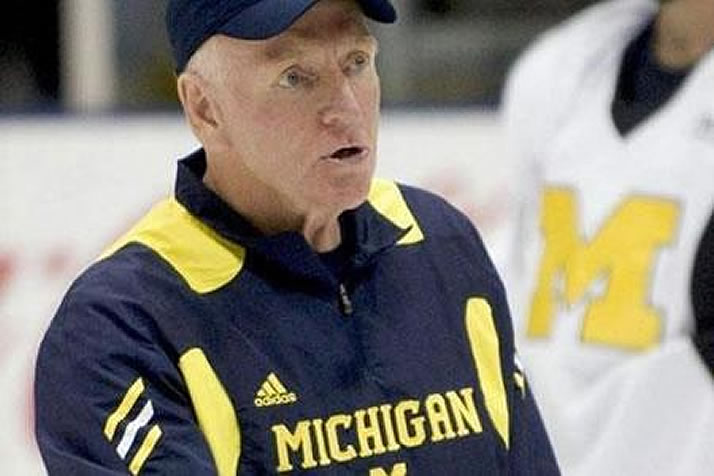


By Bob Snow - NHL.com
It's Oct. 15 in Durham, N.H., 24 hours removed from a top-10 matchup between Michigan and the UNH Wildcats in the fourth game of his 27th season behind the Wolverines bench.
At 70 years young, Gordon "Red" Berenson ambles down the hallway to the visitor's locker room in the Whittemore Center, leading yet another group of young charges aiming for two major goals come March and April -- a 21st-straight appearance in the NCAA Tournament and a 10th NCAA title for his alma mater.
The 20 and nine are the two most impressive records in NCAA hockey history.
His 700th career coaching win a week before put him at No. 6 all-time, and second only to Boston University's Jack Parker for wins at one school.
A season-best 35 wins came in 1996-97, sandwiched between two national titles -- one in 1996 led by Brendan Morrison, and another in 1998 backstopped by Marty Turco.
Dressed in a maize-and-blue sweat suit with a new three-year contract -- and a player's bag slung over each shoulder -- Berenson keeps carrying his load, while adding to a resume that is one of the most impressive in the history of the sport, regardless of level.
"To me," said Wildcats coach Dick Umile, "he's a legend. Red's seen it all."
"All" also includes a three-year playing career at Michigan (1959-62), a 17-year NHL playing career (1962-78) with the Canadiens, Rangers, Blues and Red Wings, and an NHL coaching career from 1978-84, including three years as coach of the Blues and two with Buffalo as an assistant.
And those 27 years at the helm of one of college hockey's most dynamic programs.
Berenson tallied 49 points his junior season and 70 as a senior at Michigan. Sophomore stats were not kept in the days of three-year varsity eligibility.
In 987 NHL games, he totaled 261 goals and 658 points. His best season was 1968-69, when he had 35 goals and 82 points. The next season, he led the Blues to the Stanley Cup Final against Boston, scoring 33 goals and 72 points.
"I was playing juniors in Regina," Berenson said of how he ended up in Ann Arbor. "A couple of teammates and I actually went to the library and looked up the U.S. schools that offered hockey and were rated high academic schools. Michigan came up right away. We considered North Dakota and Denver and Colorado, but Michigan had a mystique about it and it was near Detroit, so we got to see NHL hockey for the first time.
"College was really an unheard of thing at that time, but the coach of our junior team, Murray Armstrong, took the coaching job at Denver and he was luring players to Denver. He'd been an NHL player and preaching life after hockey, especially the value of getting an education and not being a hockey bum.
"All that really registered with me, so (going to Michigan) was the best thing for me. Five of us went to Michigan together from Regina and we all graduated. And I also ended up getting my Master's in business."
With a complete transformation in the college game the past 50 years, how does Berenson feel about the differences in today's game?
"No question, it's more about defense today," he said. "I don't know if the scores were any higher back then, but it seems there was more offense emphasis. Now the game is better coached, better researched with video. There aren't any secrets in the game today. We're dealing with a much tighter game today. The referees have had to loosen up and call all the hooking and holding that was maybe prevalent in our day."
Rather play in your heyday or today, Red?
"No question I'd rather play then than now," he said. "There weren't as many top players going to the colleges; they relied mostly on the Canadian players, but now you have most from the U.S."
In the 1960s you could count the number of college players in the NHL on one hand -- the major reason for Berenson's proudest NHL reflection.
"The accomplishment of signing with Montreal the day after my last game at Michigan and proving you could go to college and still play in the NHL was the best thing in my pro career," he said. "To play in the Original Six era and in Montreal was pretty special.
"St. Louis was as good as it gets -- all the way to the Finals (in 1970). Montreal was the top team in the Original Six, and St. Louis emerged as the top team in expansion. I played my best hockey there."
What was the genesis of coaching at the college level?
"Michigan contacted me when I was (playing) in Detroit to come back as coach," he said. "That wasn't a good time. Then they contacted me when I was head coach in St. Louis and that wasn't a good time. When I was assistant coach in Buffalo, that seemed the right time.
"When I took over, I said, 'Michigan is a sleeping giant.' And we're still waking up."
Since 1984, it's been a great time for Berenson -- and the great awakening has turned the Wolverines' program into one of the NCAA's most formidable.
"I wasn't looking for a college job, but Michigan had a special place in my heart," Berenson said. "I thought it was good time to give something back and do something I really believed in -- helping kids get an education that want to be hockey players.
How do 27 years meld together?
"You recruit kids and watch them grow, and the next group comes in, and before you know it, the years run by," he said. "People would say, 'Michigan is good, but they don't know how to win.' We finally got that monkey off our backs in '96 (beating Colorado College in the final). We had a better team the next year and got upset by BU, and then came back to win it all with a young team in '98."
Get Berenson into a conversation about his biggest NCAA concern, and it always comes down to one thing: "Stay in school."
"(The four-year players) did it right," he said. "And I think from their perspective, they don't have any regrets. Not that there's a wrong way because not many left early in the days when Morrison and (Mike) Knuble and (John) Madden were playing.
"I'm not holding kids back from playing in the NHL. If they're ready, like Jack Johnson, I'll drive them to the airport. And yet there are kids that leave too early and we're seeing too much of that. The NHL is also now seeing the effects of signing kids too early."
What lights his lamp after 50 years of carrying many a bag?
"Camping in Canada, just the guys," he said. "I've taken some players. Matt Hunwick with the Bruins came this year. He can paddle. Did it for seven days with me. It's a good way to get away. It clears my mind. I did it as a player. I enjoy the physical-ness of it, and no phones, no nothing. You really forget about everything. Then you come back and ready to go again."
Berenson and Michigan also are ready for the biggest hockey spectacle in history -- an outdoor game in the school's football stadium Dec. 11 against archrival Michigan State.
"I'm excited about that," he said. "There's no question. We've already sold over 100,000 seats. This will be an unbelievable event. We played before 75,000 in Spartan Stadium (in 2001). Gordie Howe dropped the first puck and said, 'I thought I'd seen everything in hockey, but I've never seen anything like this.'
"Wait'll they see the game at Michigan.
"Look, it's been 27 years. I've had great players and a staff that's solid as a rock. I didn't go to Michigan with the idea I'd be here this long. I went to try to build the program into a dynasty, if you could.
"I can't tell you it was part of the plan, but I'm glad I stayed."
So are quite a few others.